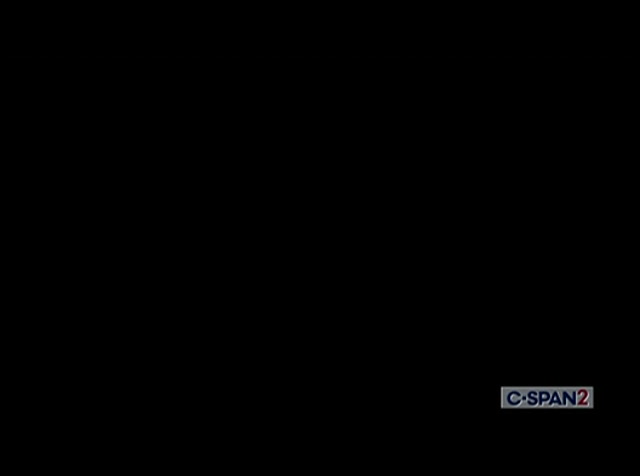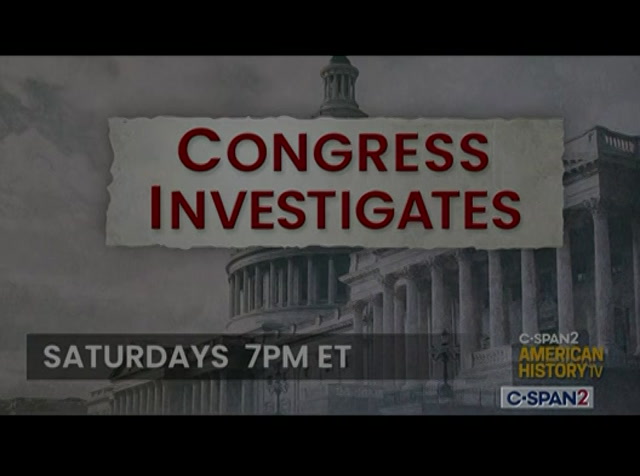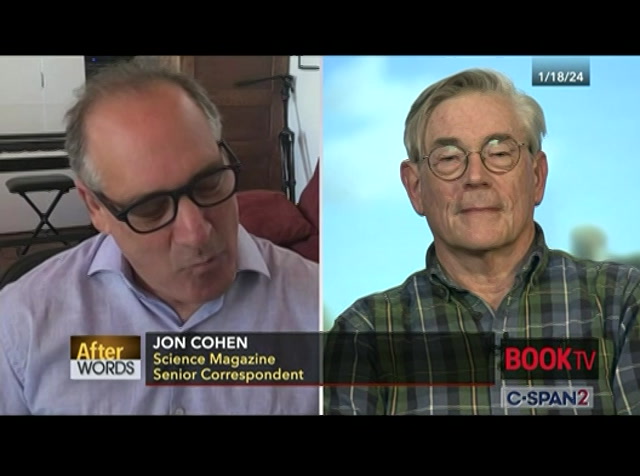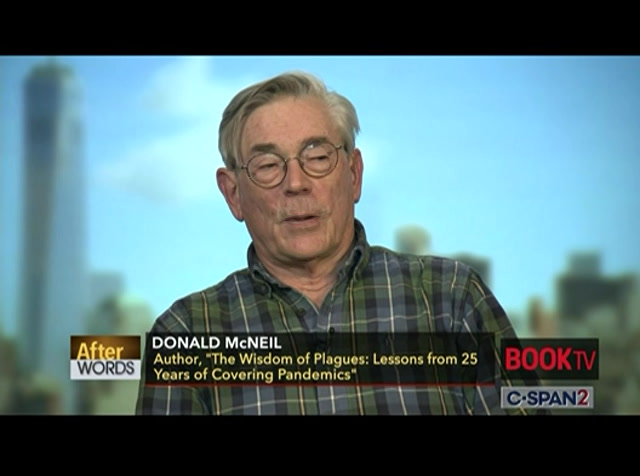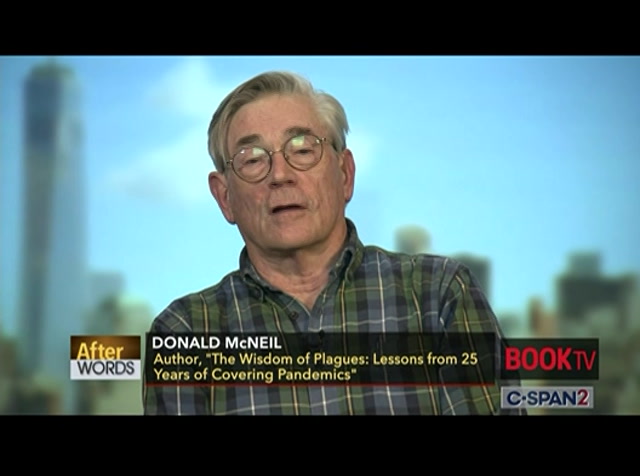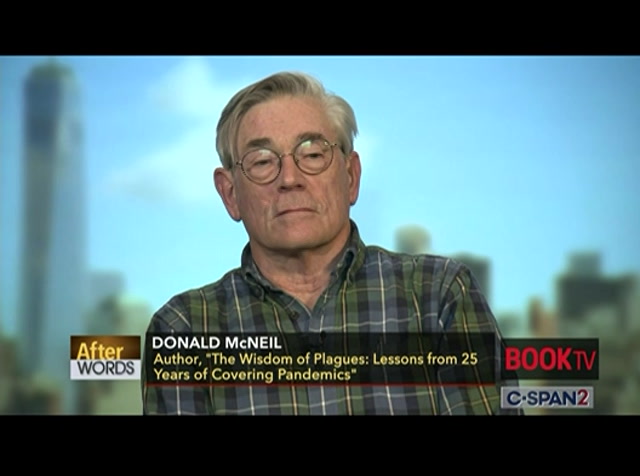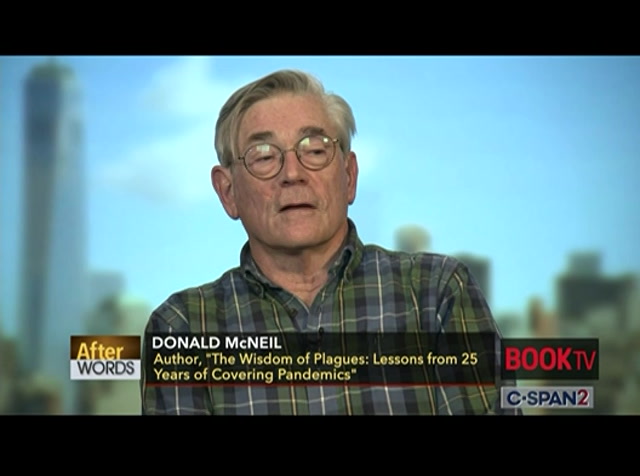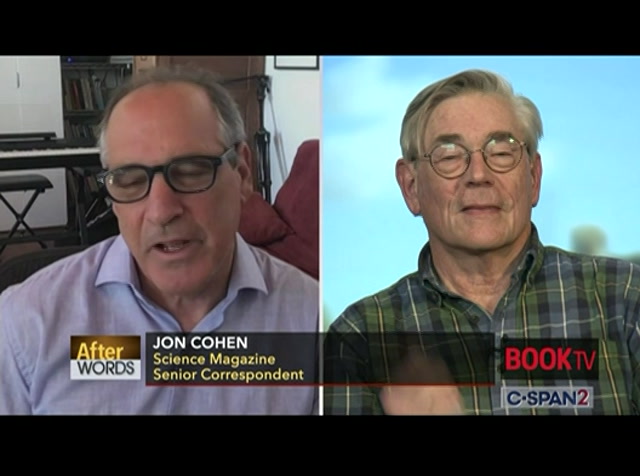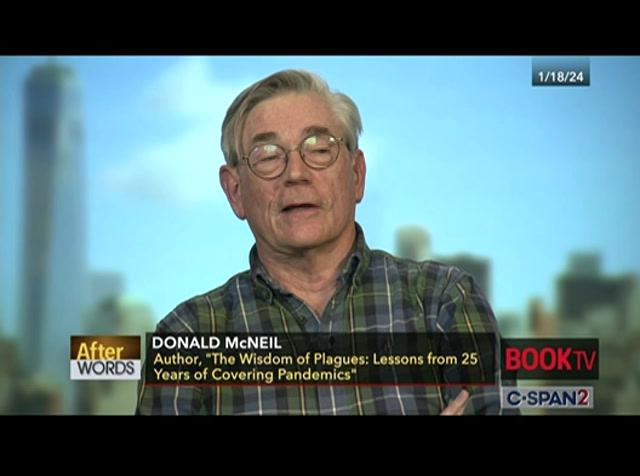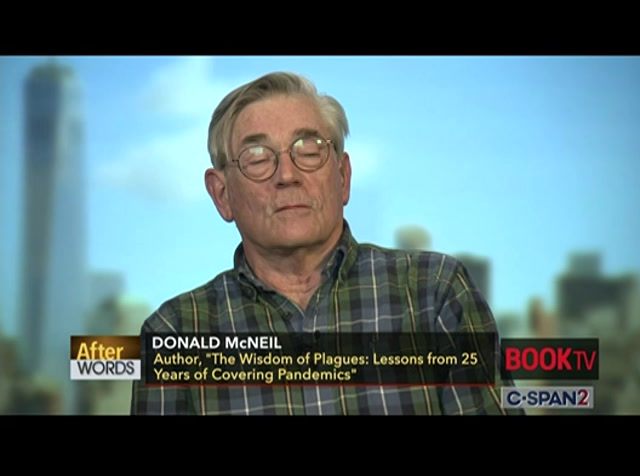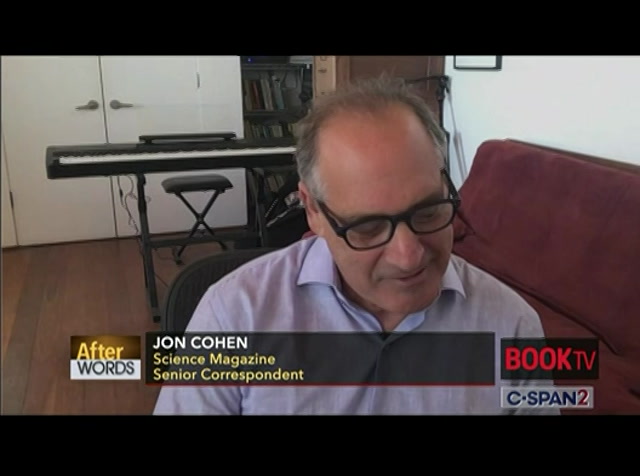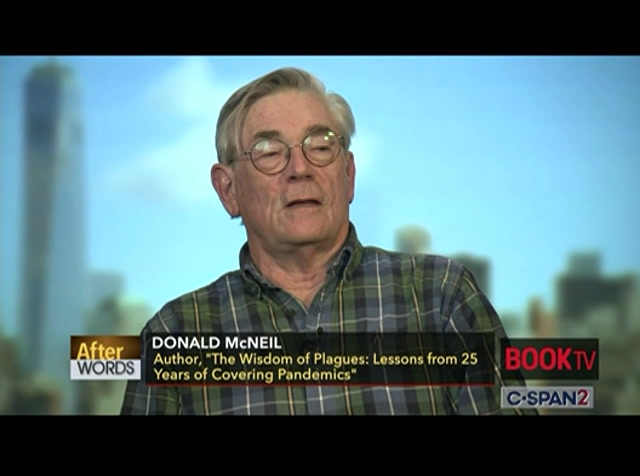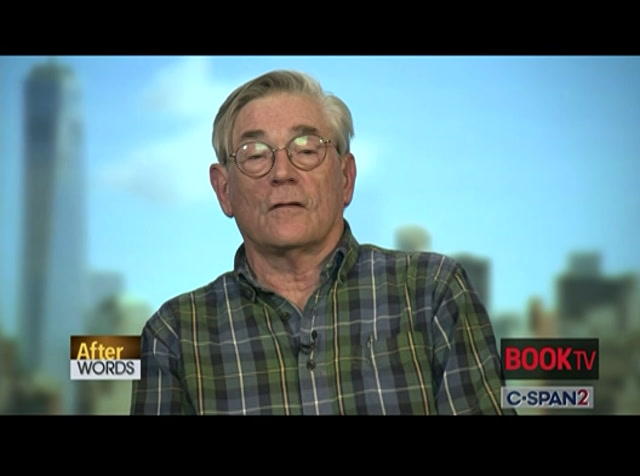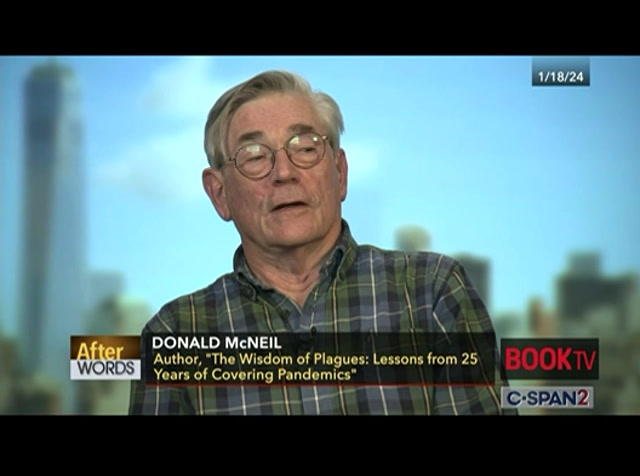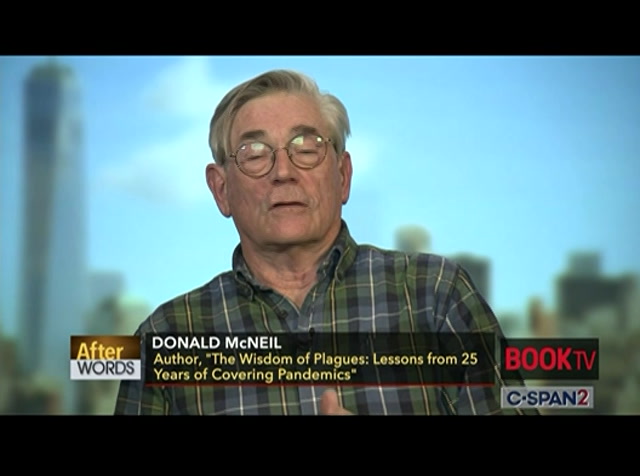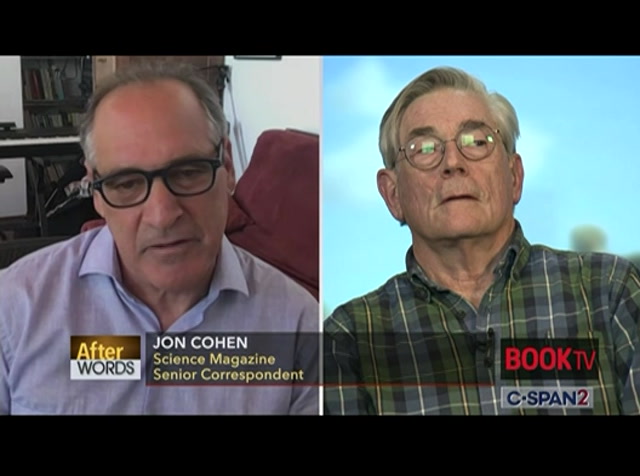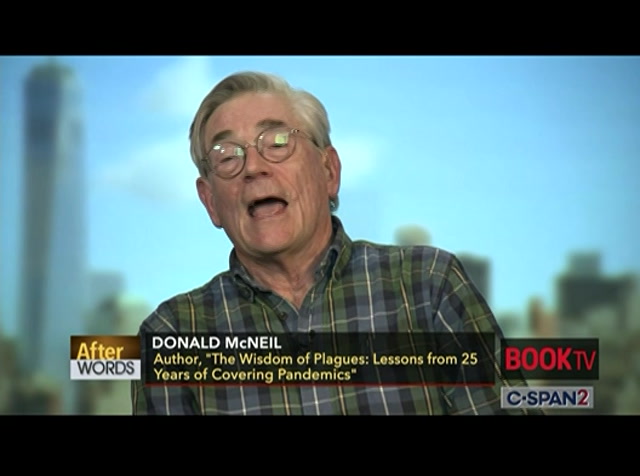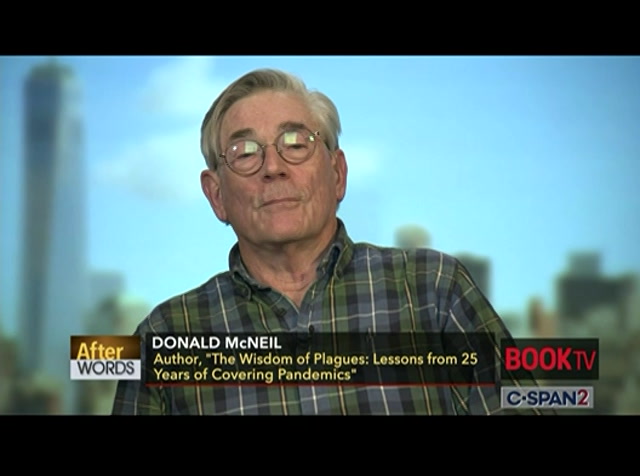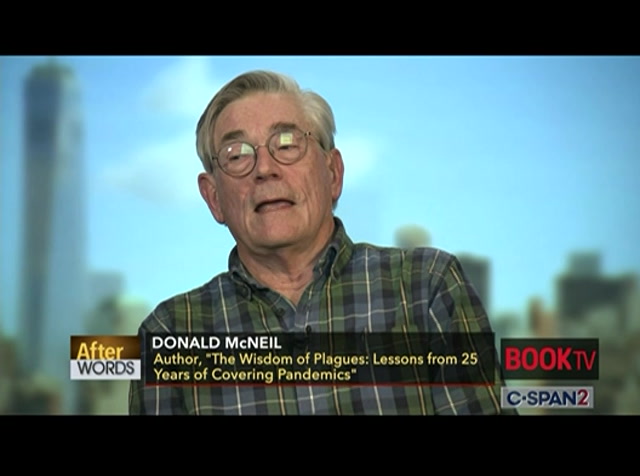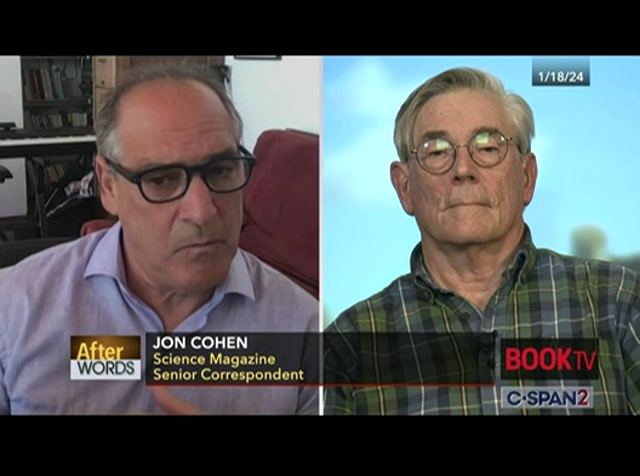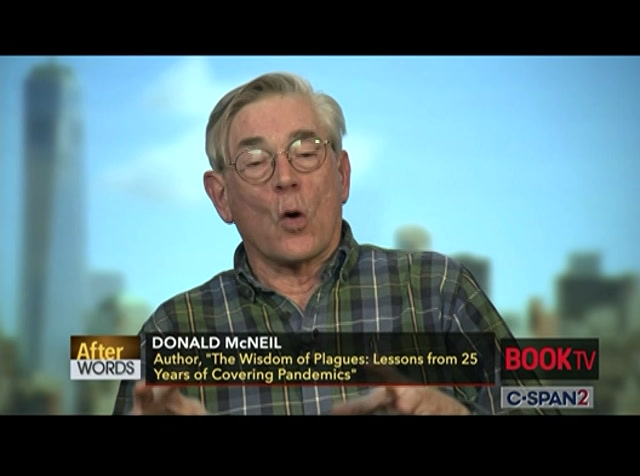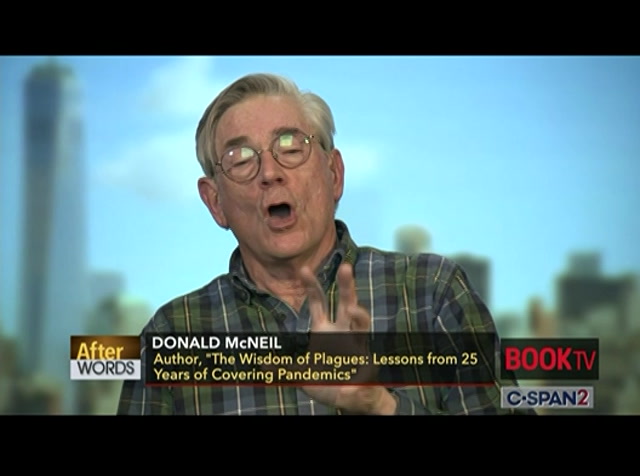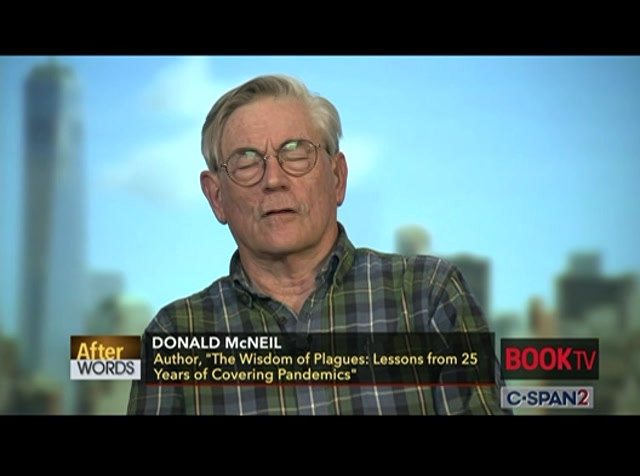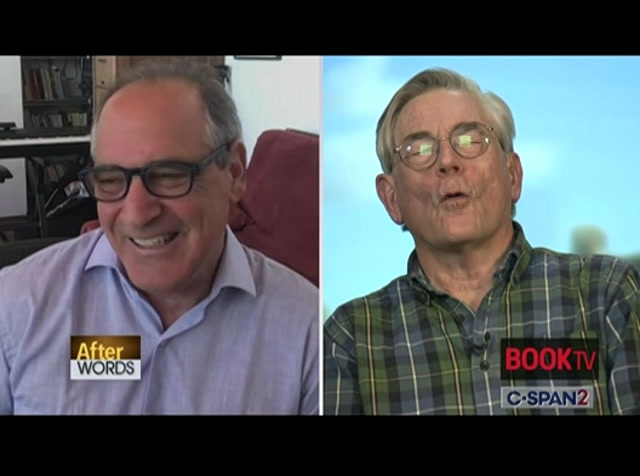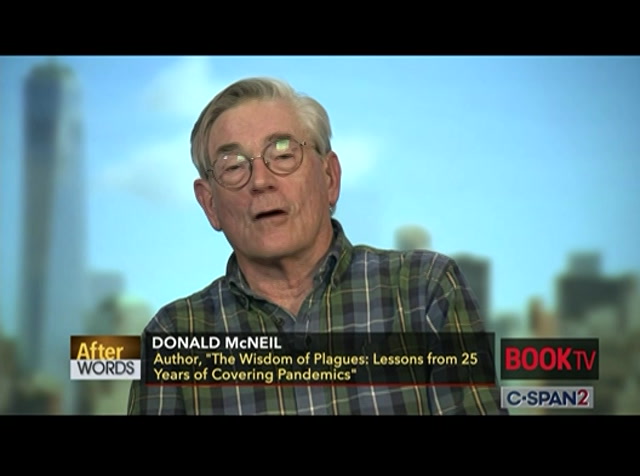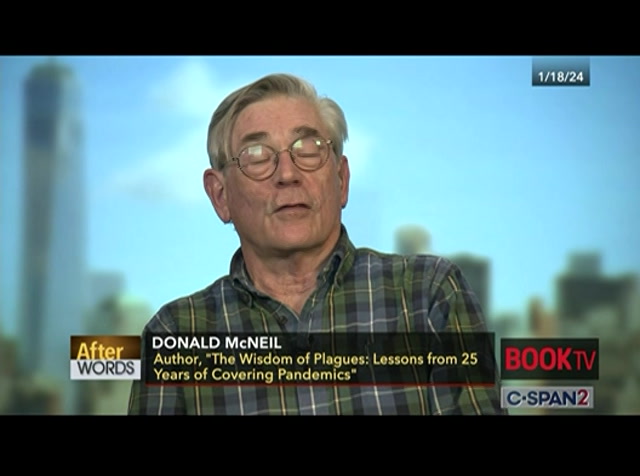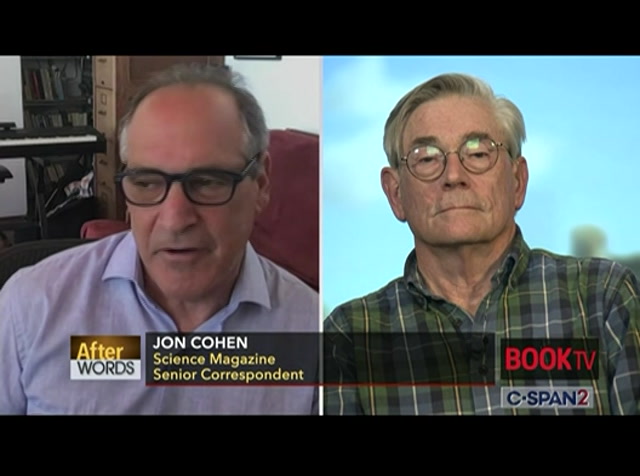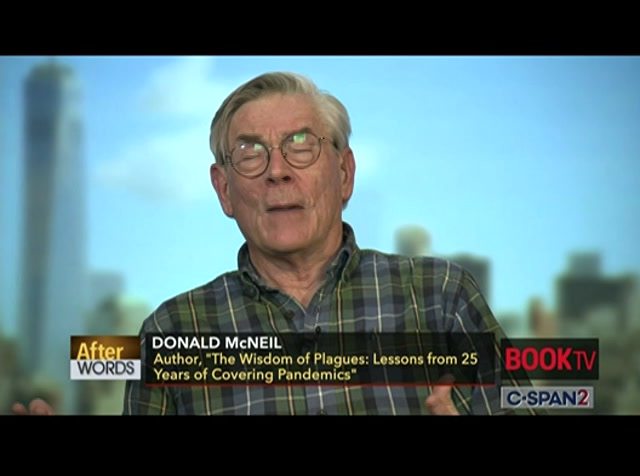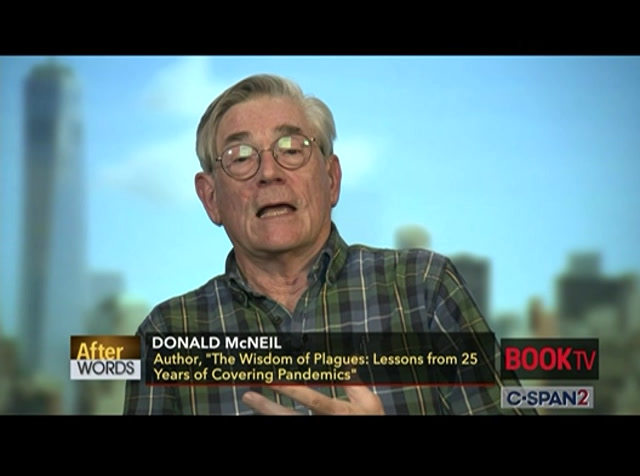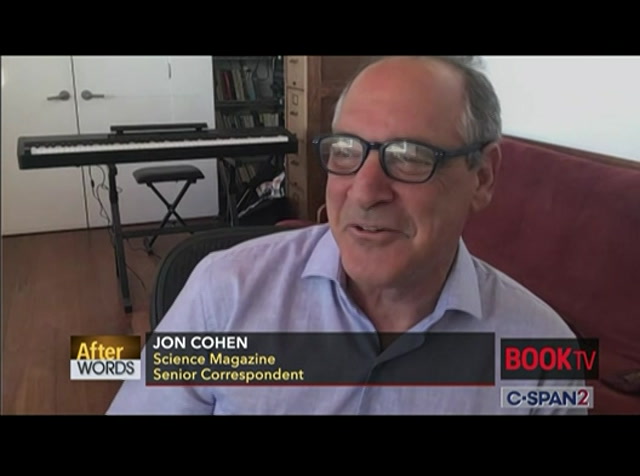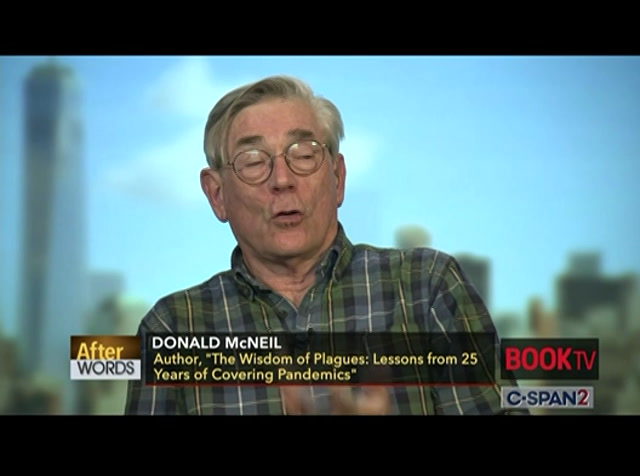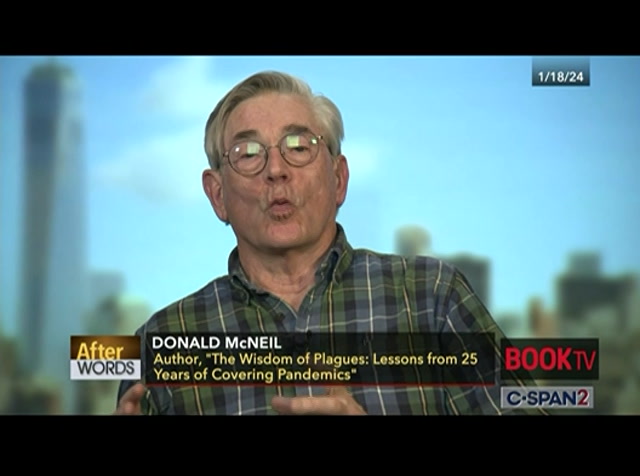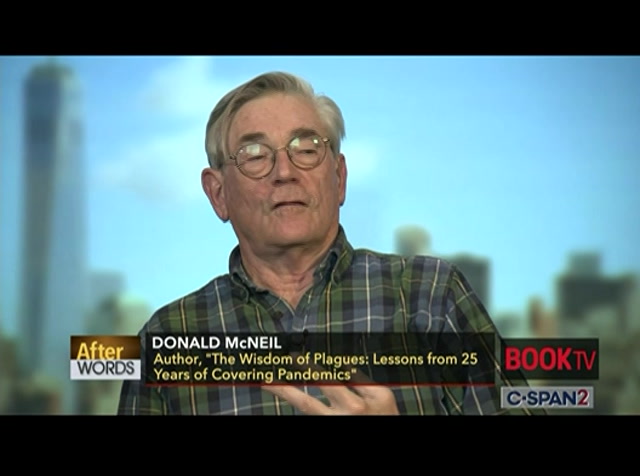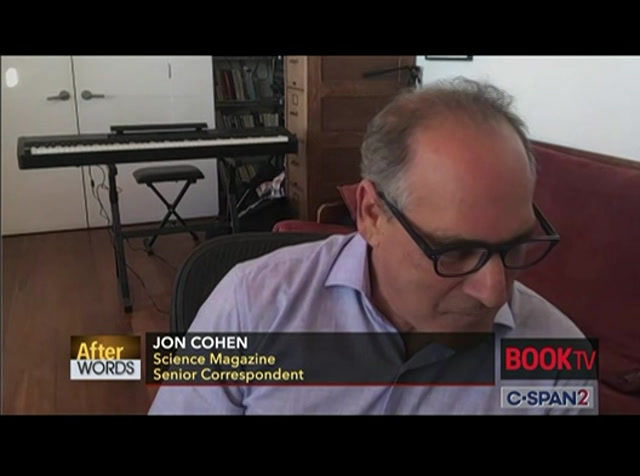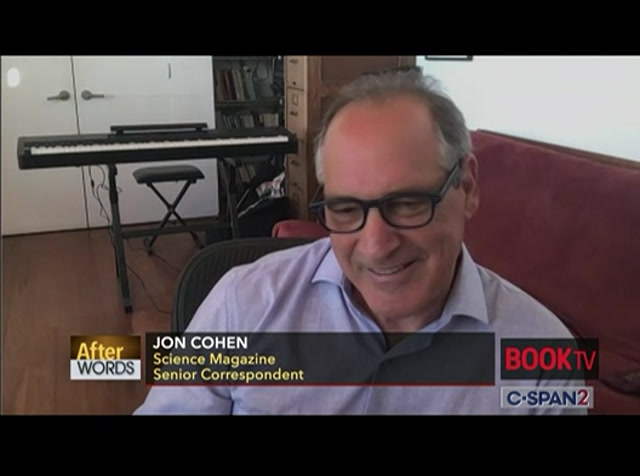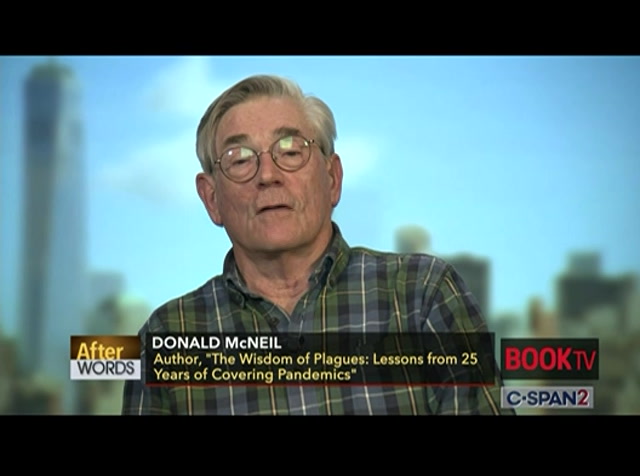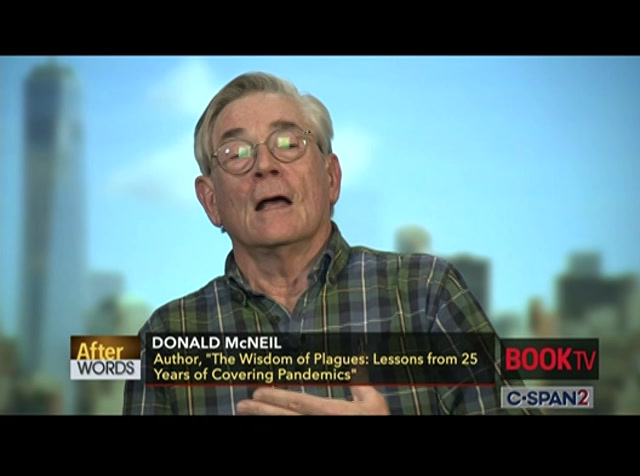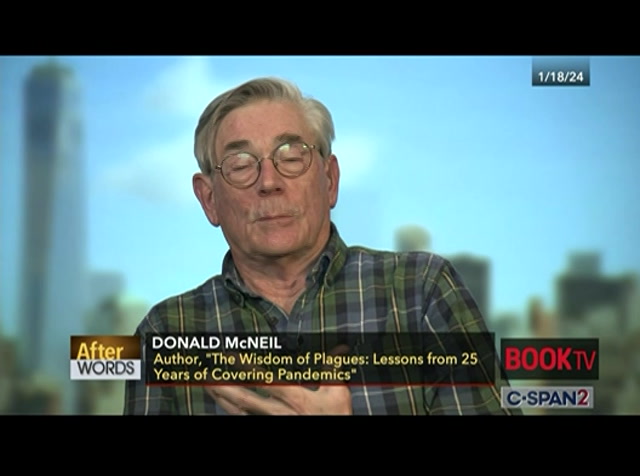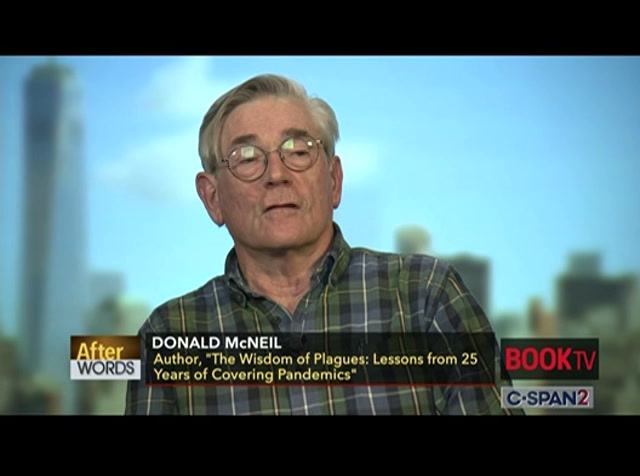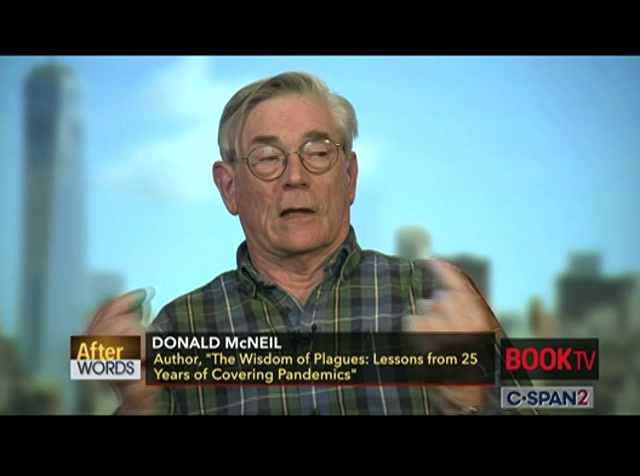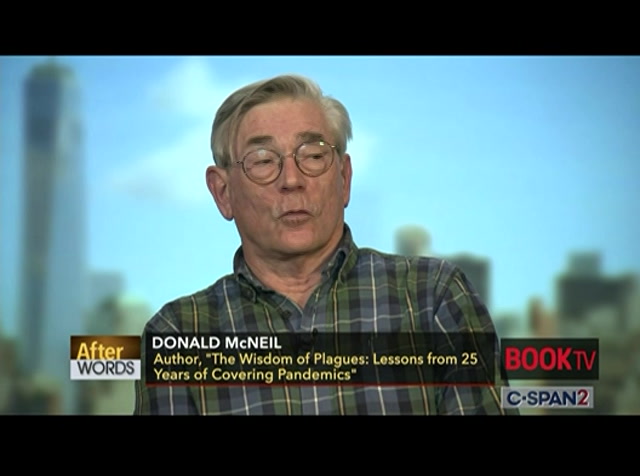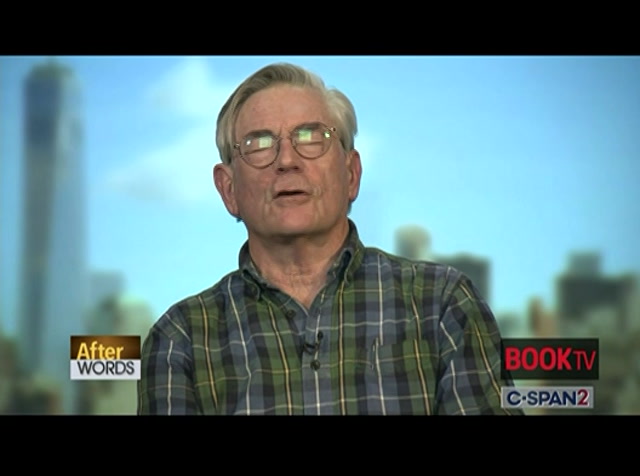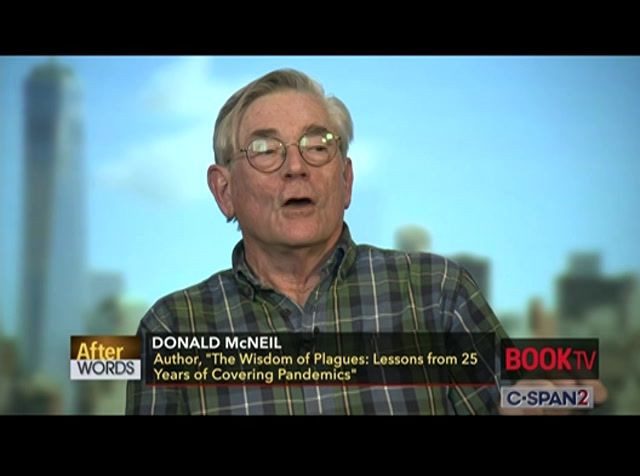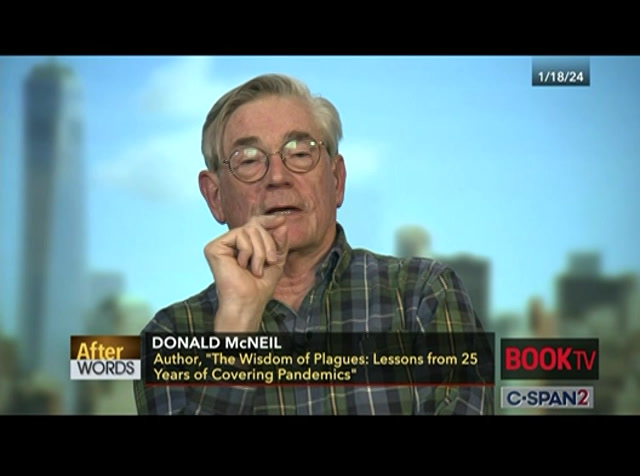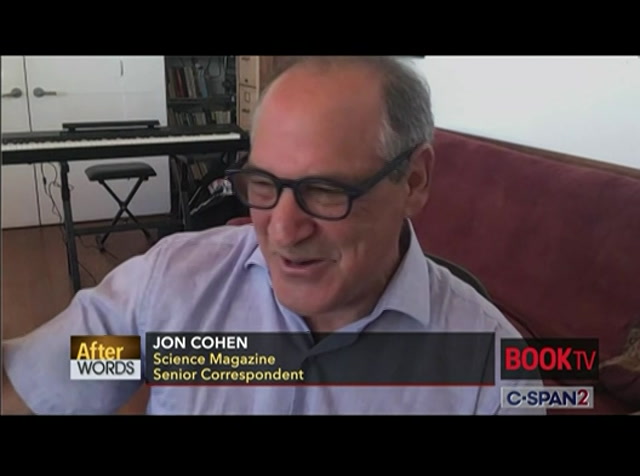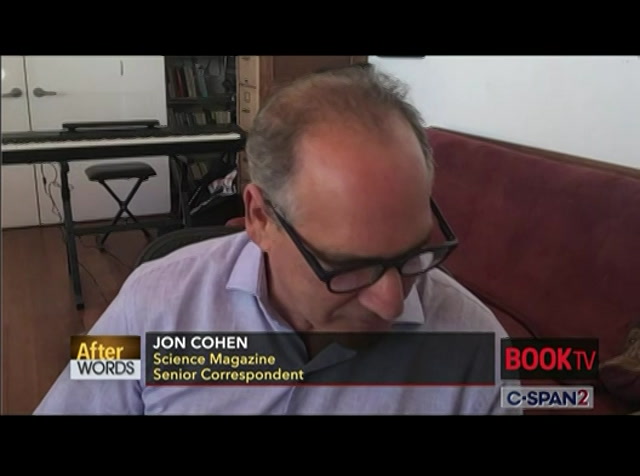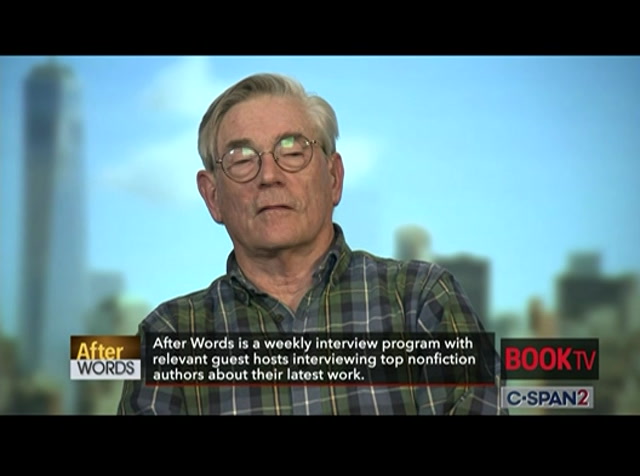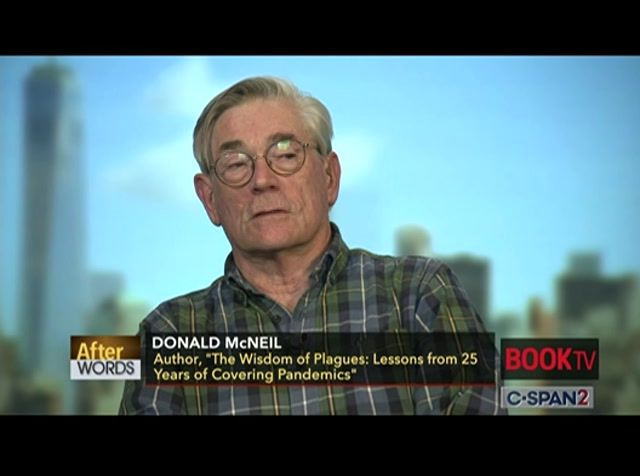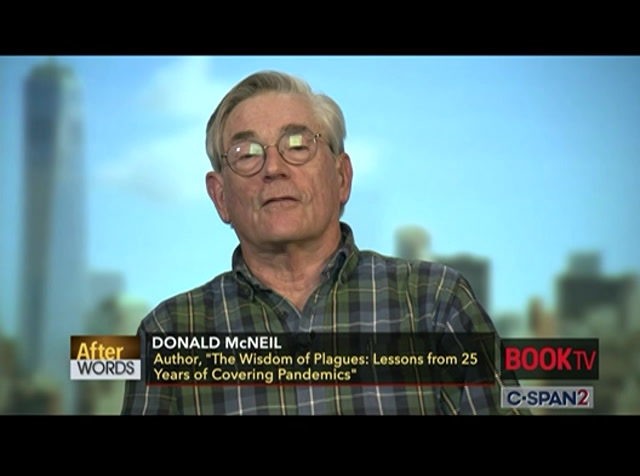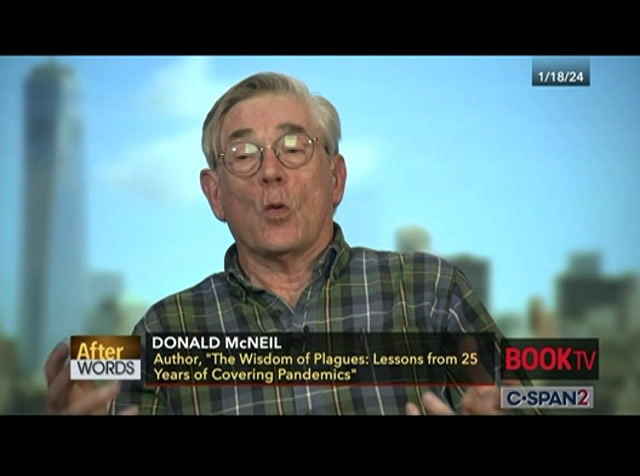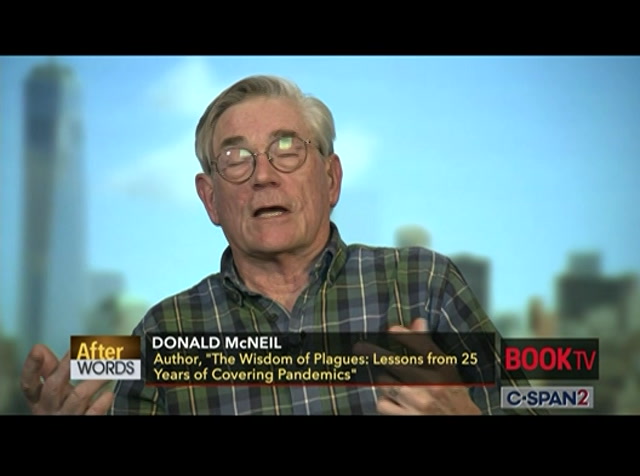tv After Words Donald Mc Neil The Wisdom of Plagues - Lessons from 25 Years... CSPAN March 28, 2024 5:26pm-6:18pm EDT
5:27 pm
donald g. mcneil, jr. good to speak with you again. nice to see you, john scullin. so i want to start with a very general question. why did you title it the wisdom of plagues? i didn't. i had an idea as like, you know, it's going to happen again or, you know, they keep on coming or something like that. but the head of simon and schuster said, my appeal when i was covering covid for the times and appearing on the daily was that i was this wise old uncle mortimer, the epidemiologist, who was reassuring people that they weren't all going to die. and so he wanted the name wisdom in there. so we smooshed together wisdom and plagues. and there you go. so it strikes me that the book is part memoir, part journalism. and as you say yourself, part sermon. the memoir side of it, you wrote
5:28 pm
what saved the most lives. this book, i hope, will be a hard look at some answers. and you became interested and started doing science writing because of hiv aids in south africa. right? correct. yes. what year was that and what were you doing then? it started in 1997. i was a regular foreign correspondent in south africa. there wasn't actually it wasn't obvious how many people were going to die in south africa at the time because the virus came a little later to south africa than it did to the rest of africa because of the the boycotts and that semi closed borders that took place because of apartheid. but but what really drew me into it was i was asked there was somebody at the consulate who was outraged about a bill, the u.s. consulate, about a bill that the south african parliament was about to pass that would allow the government to import drugs from anywhere where they would be cheaper and cancel any patents and at first
5:29 pm
i thought this sounded kind of outrageous. but the more reporting i did, the more i realized, you know, this is what all governments do, including the united states government. and the south africans were just trying to lower the prices of drugs. and the first reporting i did was in a was in a a baby sanctuary, a orphanage. and the class i was visiting was the aids orphans, all of whom were going to die. and there was no there was no medicine for them. there was no medicine for anybody in south africa. and that story is what got me interested in the whole beat. and then i'm curious what led you to broaden out to other diseases? i remember a series you did a terrific series about eradicating disease. was that what broadened your interest beyond hiv aids? well, what happened was, after seven years overseas, my wife and i came as both of us reporters. we came back to new york and kind of abruptly and there was no plan for what to do with me and the editor in chief first asked if i wanted to go back to culture reporting, which is what
5:30 pm
i'd done before. i was a foreign correspondent. and i said, no, i didn't want to cover broadway again. it seemed like it was like a scene out of a past life that i sort of forgotten. so he said, you want to be a science reporter? i thought that sounded like a challenge. so he sent me to the science editor. she said, i need a health writer. i said, well, you've got two doctors on your staff covering, you know, cancer and heart disease and the things americans die of, and they're better than me. how about i cover essentially third world disease? it was called then, you know, aids, malaria, tuberculosis, worm diseases, mosquito borne diseases and stuff. and she originally said, we don't do that and then decided to make it an experiment. and that's how i got started. and that and then i realized a couple of years later, how many diseases were sort of hovering on the brink of eradication but couldn't quite get eradicated the way smallpox was. and i decided, let's do a series on why each one of these diseases can't be quite pushed over the edge into eradication.
5:31 pm
so we did everything from measles to guinea worm. i worked on this with celia dugger, and we did measles, guinea worm, trachoma, and a bunch of other diseases that were all sort on hovering but couldn't quite be eradicated. so you wrote in the book that you hadn't wished for it but covered made you useful, which was exhilarating. and i had the same sense covering covid that i felt more useful than ever before. tell me about. well, you know, most of the time a lot of the diseases we cover are pretty obscure and they're happening to dark skinned people in faraway countries. and not a lot of americans care. so i often would write something about malaria or something in a in a small village in africa. and i'd find out i had 35,000 readers because you can read the times software and find out how many readers you have, and suddenly you're covering a disease that americans are threatened about. and the first story i did about
5:32 pm
about covid saying it was going to be a pandemic, had 7 million readers and suddenly everybody cares about what you're doing. and you feel like, hey, i you know, i've trained for 25 years. i know how pandemics unfold. i know what's likely to happen. there's going to be a round of disbelief and then there's going to be a round of fatalism. and then there's going to be a round of rejection ism and rumors that people don't believe it. and then there's going to be profiteers who are trying to make money off the disease and and sure enough, all these things happened with covid and, you know, you and i seen all those things happen with aids. we've seen them happen with with malaria and other diseases. there's this whole weird cycle of response cases to that, to the pandemic that kind of repeats itself the same every time, but different every time. and so you can you feel. yes. and also people look to you for advice and that becomes i think you become comforting. and so, yeah, i ended up feeling useful. i live in wildfire fire territory in california and
5:33 pm
whenever we have these wildfires, we glue ourselves to media and i had that same sense that this was a wildfire fire and people were gluing themselves to us. yeah, you're right. i it was like that. you know, i mean, cnn did nonstop pandemic coverage for months and months and months. and now it never gets mentioned. it was you know, it was the story of the moment for and really for more than a year here, one of the fun things in your book is you take the gloves off, you wrote, i know i'll provoke anger. i don't care. i'm not trying to please anyone. i was never very interested in that anyway. and now in retirement, i'm even less so. and you wrote craving to be liked in many ways is antithetical to the ability to be a good public health leader. and the same could be said of journalist. how did it feel to take the gloves off and not be constrained by working for the new york times and having to be balanced at every turn and have a measured tone? it's an enormous relief. i mean, it's also an enormous
5:34 pm
relief not to be working for an editor every day, especially an editor who's, you know, instinct is, oh, god, we can't let him say that. or or, oh, god, you know, are you sure that's true? well, of course i'm sure it's true. but i mean, you know, there were all sorts of times i was sort of pulled back from the brink. and so, yeah, to be able to say how i really feel. i mean, look, i'm not stylizing myself as a public health leader here that those are sort of two separate sets of i mean, yes, i feel better that i'm unfettered and i'm allowed to state my opinions and tell all the memoirs from my own life and what went on behind the scenes at the times and stuff like that. that shows how frustrated i could get trying to tell what i thought was the truth and being held back by editors. but it's a separate argument to say, look, i think public health leaders need to be tougher. they need to be sort of like they were 100 years ago when you had one deadly pandemic after another. i mean, public health leaders now evolve. all the medical school in the united states. and they've all learned to have these these sort of warm,
5:35 pm
friendly bedside manners. but when you're a public health leader, you sometimes have to order people into quarantine. you have to find a way to get people to vaccinate. and you can't always do it by convincing them because it's going to be a number of people who just reject it and refuse. and if they if they're allowed to refuse, they will keep passing the disease on to their families, to their friends, to their kids, to their grandparents, to their church mates, to their poker buddies and everybody else and the pandemic will continue. and that's i find that dangerous. and i'm arguing that public health leaders need to be tougher, need to say, no, you got to obey these orders and the laws that have existed on the books for more than a century. it's just that we don't use them. yeah. and you wrote that there's a sense that we have no obligation to protect each other or even each other's children and parents. yeah. and i find that horrible that people don't feel people act like, you know, i won't do it. and you can't make me. and, you know, i've done my own research and i don't want you putting that in my body and i don't care. and you know, people who do that
5:36 pm
go on to infect others and they keep it going and other people die because of their selfishness and, you know, you wouldn't tolerate that in war. you wouldn't tolerate a soldier who says, you know, i don't like it here. i'm going home and the rest of you can heal. good luck with the with the enemy. we, you know, we shouldn't tolerate it when we're under attack from a disease to heart of the sermon of the book is you call for a pentagon, for disease, for things like uniform arms and ranks in public health officials, and for banning religious exemptions and even going so far as to seize the assets or charge doctors with manslaughter if they're pushing snake oil. how realistic do you think it is to have the iron fist and each one of these is is the most extreme example. the whole it's what the far right has glommed onto. it's it's the notion that i want to be emperor of the world or something, and i'm trying to dictate i mean, one thing a pentagon disease is for pet
5:37 pm
disease. when i said that, it's mostly i want us to be able to respond to pandemics in as organized a way as we respond to pearl harbor or, you know, fort sumter or something like, you know, to to an invasion, to an act of war. we have a very clear response system, and we train our military to respond to acts of war, shoot missiles at our ships, and we'll find a way to shoot, you know, shoot back at the houthis. we see this all the time. we have this kind of messy state by state. you know, cdc, fda, hhs, there's no one in charge when we have to respond to diseases. so that was, you know, the uniform is that was just a sort of a you know, that might even be necessary, might be helpful. we do have people in uniform like the surgeon general at i don't want to have to die on the hill of of, you know, defending the most extreme versions of what i said, mostly i want a better, more organized response, but in answer to your question, what am i what do i think the
5:38 pm
chances are of this passing zero zero? i recognize that congress there's no way congress is going to pass a single thing that i propose. but i'm trying to get people to think about a different way to respond to diseases. so that not so many people die in a way, what i'm trying to do is get into the heads of today's generation of medical students and public health students and say to them, you know, it doesn't have to go as badly as it did during covid. and covid was a cakewalk of a pandemic compared to some of the other pandemics we faced in the past and those we might face in the future. but you point to china and the way that they had forced isolation of infected people and indeed it was effective of china in 2020, by march had stopped the spread, which no one thought was possible in the public health world. and they did it. but i interviewed someone at the time who said, look, you could take infected people out of the public square and shoot them. you'd have the same effect. there is a point at which
5:39 pm
populations will not put up with what china put up with. and you know, where do you draw that line in terms of what in america comes down to people being upset about their liberties being taken away and the public good where do you draw that line? certainly we're not going to shoot people in the public square. but you think it's okay to have forced isolation of people? well, remember, we did have forced isolation of people in this country, but we didn't do a very good job of it. we did have vaccine passports in new york city, but all we used them for was for getting into restaurants. we did have vaccine mandates for you know, for hospitals, for corporations. for a while we had them for corporations of more than 100 employees and stuff. i mean, am i going to defend the idea of taking people out to the public square and shooting them? no, of course not. am i going to defend what china did? what china did was incredibly effective. there's no way that could have happened in this country because we're not china. and i said that the first time i
5:40 pm
appeared on the daily, i said, look, they are actually slowing down the the disease that is is transmissible is flu. and no one's ever done that before. no one even conceived of being able to do that before. and we to stop this disease in this country, we would need to do something similar. but i said i don't think that's ever going to happen because, you know, people are going to rebel. and in china, they finally rebelled after three years. and it was a combination of the macron variant was so infectious that, you know, it was infecting everybody despite shutdowns and isolation policy. but for three years, they managed to hold off the disease and they had a semi functioning economy. if we'd had a better lockdown, we could have, i think, ended the pandemic a lot sooner and with fewer deaths, we would have had less transmission before the vaccine was invented. and then after the vaccine was invented, if everybody had taken it and had taken the booster, a lot fewer americans would have died. we wouldn't have had that. keep the schools closed as long as we did. we wouldn't have to keep masking as long as we did, it would have
5:41 pm
become what it's become now. essentially another flu season. it would have to happen sooner. the i want to move away from the absurd idea of shooting people. what china really did was forced people into gymnasiums who were infected. and you wrote about it at the time. there were photos, i remember, of this that were startling. and i thought we would never do that in the united states. do you are you advocate hating that we move infected people into things like giant gymnasium as as china did. the reason for moving for those gymnasiums was they recognized that 70 to 80% of all transmission was within families. so they tested people as fast as they could. and as soon as somebody came up positive, they would say, we're going to move you away from your families. so you don't give this disease to your kids and your husband and your grandmother. and we want you to spend, you know, up to two weeks sleeping in a gymnasium with other people
5:42 pm
who are suffering. you'll be with other people who've got the same disease. you do if you crash. and that second week crash was a quite a common phenomenon with early covid. if you crash and suddenly your lungs are filling with fluid and you can't breathe, we will be right there with nurses and oxygen machines and be able to get you on oxygen and hospitalize you. so i actually saw this as a benign and intelligent way of handling the disease. i mean, when chris cuomo got the disease, what does he do? he goes and he moves into his basement and nonetheless, from his basement, he manages to transmit the disease to the rest of his family. you know, on cnn, great. all i did was spread the disease, you know, home quarantine was a disaster in that disease. home quarantine is by and large, a disaster in any highly transmissible respiratory disease. so. so, do you think we could do it? could we isolate people away from their homes in this country? i mean, now, after all the polarization that's gone on from this pandemic, no, no way.
5:43 pm
i mean, people are ready to people are ready to kill over anything now because, you know, because the trump, biden, democrat or republican, whatever name the way you think the country is polarized but had we been better about no home isolation at the beginning of that pandemic when everybody was nervous? i mean, we forget that there was a period back in early 2020 where first there was a lot of skepticism and everybody, you know, no, there's no reason to cancel the st patrick's day parade. no, there's no reason to, you know, to cancel the basketball season. but then people got scared and there was a period of a few months where everyone, including president trump, was ready to take measures to prevent the spread of the disease. he recognized that as many as 2 million people might have died by october. and that's why he started that thing called 15 days to stop the spread. he endorsed lockdowns originally, but then when the complaints began to rise and when it didn't all disappear, after 15 days, then he changed his tune and started to say, oh, the country has all got to open
5:44 pm
up again by memorial day. and, you know, when the country opened up again by memorial day, you got what had been a an epidemic that was largely, you know, terrible in new york, terrible in northern california and washington, but not spread around the country. you got spread all around the country. you had a big uptick of cases in the south and the other country, the other states that had taken they're going out of lockdown early and then you had kind of quiet time in the summer and then you had the gigantic surge and the big surge of this in that first winter. so in in another time, in an era where we had not experienced a pandemic, and in that polarized our country, yeah, i think we could have done better. your book made me think a lot about this question that has bothered me a lot, and that's why the divide occurs in the united states and other countries and why there is so much hand-wringing about wearing masks, not wearing masks about how far away social distancing
5:45 pm
should be. and it strikes me that the one side is that fist in the air. liberty is erring on the side of selfishness and the other side that wants to save every life is airing on the side of caution. and that's the ultimate dilemma, is that you have these two sides that have different values, liberty versus saving every life, and they both make mistakes. but the mistakes, on the one hand, are about selfish ness, and on the other they're about making pronouncements that are meant to protect people that aren't necessary. but what do you think? i completely agree with that. i mean, i think and there are chapters in the book about that, about the fetishization of science. i mean, i haven't worn a mask since february of 2022. and i'm on the subways and i'm on airplanes and everything else. and yet there are people i see, you know, i mean, in most of the country where if i go places the
5:46 pm
trout fishing, i don't see anybody in a mask for days on end. and i didn't even back in 2000, 20, 22. but now i see people wearing masks on the subways. i see people arguing with me about masks. and i go like, there's no point. i personally, i'm back to my pre 2019 attitude about illness, which is that, you know, i'm going to get some colds, i might get the flu, i get my flu shot every year. i get my covid shot. i do what i can to protect myself. but i'm not going to live in fear. and i do think there are way too many people in new york, particularly in san francisco and places like that, where that want to impose their fear on everybody else. and i think that's ridiculous. but i think it's equally ridiculous that people there are people who just say, you know, i won't do it. you can't make me like like me. when i was nine years old to my parents and and and, you know, and they won't do anything to protect themselves. and they think of it as a purely personal decision. and it's not because it's failing to protect others, but i don't necessarily think that this polarization came out of science. i think this polarization came out of politics. i mean, don't forget, you know,
5:47 pm
donald trump came into office saying that obamacare, you know, we're got to get rid of obamacare. obamacare, you know, under the aca might have been one of the great, you know, health care advances in this country. it's bringing us a little bit closer to universal health care, which every other democracy, you know, enjoys. and yet it was a terribly polarizing fight, as if people didn't want health insurance, didn't want health care, and that kind of that that that democrat versus republican and trump versus obama era of the pandemic overlaid itself on the pandemic and sort of took over for the science. and so now everybody's kind of lined up on one side or the other, you know, vaccine refusal used to be a left wing thing, not a right wing thing. it just kind of morphed, you know, from the, you know, you can't take away my guns, too. you can't put this vaccine in my body. mississippi used to be the most vaccinated state in the country. the southern states were were the ones least likely to have any exemptions to vaccines because they'd seen the effects of no vaccines. they'd seen people die in large
5:48 pm
numbers. and we don't you know, we don't want to go back to those days again. you know, i think you put your finger on something that's one of the most absurd things about this debate to me. donald trump championed operation warp speed. he did something that both the left and the right celebrated. and they raised the vaccine through the testing process in a transport way, looking at side effects, publicly discussing the efficacy publicly and it worked. and then instead of trump embracing that, he backed away from his own great accomplishment that was being celebrated across the political spectrum. he kept it secret for months that he and melania had been vaccinated. ingenue worry as soon as they could be. he never he not only didn't get vaccinated on television the way almost everybody else did, he kept it secret. he finally revealed it because of a question at sea cap. the, you know, the conservative
5:49 pm
political action, the thing which i think was in late march and then later when he came around to endorsing boosters, he got booed by his own supporters. he you know, he got sort of trapped in his own backing away from the vaccine, even though it was a personal and political triumph for him to have done that. we did a much better vaccine than anybody else in the world. it wasn't on his watch. yeah. i want to clarify something about masks that you mentioned about what in my mind, n95 masks are incredibly effective. and if your risk tolerance is extremely low or if you have co-morbidities and are worried to this day about becoming infected, wear an n95 mask. the does don't do desire. that is you call it hygiene theater. if you're wearing a mask as well b surgical mask, you're not doing much of anything to protect yourself or others. so if you're going to do it, do it. no, no. i agree.
5:50 pm
for people who are who are immuno compromised, you know, but but absolutely it makes sense to protect yourself. but what i see is people standing on the subway platform not wearing a mask. when they get into the car, they pull the mask out of their pocket. they put it on. they sort of look at everybody like, you know, you're a bunch of, you know, infected lepers and you're going to make me sick and not going away. and then they take it off. those are getting out. i mean, it's it's that to me is hygiene theater. but i agree with you completely for the small number you read about somebody yelling at you when you're on the street by yourself, away from everyone. yeah, exactly. i mean, that was in the in the early days when i absolutely was wearing a mask, when i was indoors and i was wearing a mask if i was you know, in close proximity to other people. but people screaming at me on the street put on a mask, selfish guy, or get a mask, jerk. when i was alone on the sidewalks in april and may of of 2020, it was just it was irrational. it was this desire to police other people that, you know, you see this and everything, the
5:51 pm
desire to police other people's language and tell you what words you may use and words you may not use that extended itself into this kind of like i'm going to be the mask police and and tell you why for for not behaving the way i think you should behave and that i mean that to me really hurts the the the sensible intervention that did save lives. you know, when they as you said, they get overused, they get overcautious. you you try to keep things closed down and clamp down when they don't need to be. and you you lose the support of the people you might have had before. right. but it's difficult to turn that dial because on the one hand, you're for mandates and force strict government intervention on things. and on the other, you're saying don't overdo it. yes. and where do you draw that line is the next question. and the answer is we won't know until we get there. i mean, you know, with every disease, you know, it's transmitted in a slightly different way. it's the virus is is more transmissible, more visibly symptomatic or asymptomatic transmission, lots of other
5:52 pm
things come into it. and you always make mistakes in the beginning, just just the same as in war. you make stupid mistakes. you you lose the first battle of bull run, bull run. because you're completely unprepared and you know, and you've got an inept officer corps and you have to be honest with people and say, look, we're going to make mistakes. we did probably didn't need to wash our groceries with bleach. it would have made more sense to have worn a mask than it did to, you know, wear gardening gloves on the on the subway and avoid touching your face. you know, lots of mistakes get made and you hopefully get smarter each time. and that's what i'm arguing for, is get smart and impose the things that really will save lives and then lift them when when they don't save lives. but i can't tell you now what the where to draw the line. you know, when that moment comes, it struck me that the mistake in messaging was not saying, look, we don't know how many feet apart you should be. six feet seems reasonable. we don't have hard evidence to prove that. but let's go with that to be careful. we don't know whether masks are necessary or not necessary with
5:53 pm
hard, scientific evidence, but it's prudent. it makes sense. let's go with it. but that's not how the messaging was packaged. and i wonder, can officials package things their messages in a way that are truthful about what they don't know? i hope so. i mean, do you remember the early messaging about monkey pox? i mean, you know, and pox now we'd gone through a pandemic, was all there. and the and the first advice from the cdc about avoiding in pox said nothing about the fact that it was transmitted largely within a subset of, you know, highly sexual acts, of a subset of gay men. instead, said, you know, if you go overseas, avoid people with open sores. well, obviously, good advice, avoid eating rodents and wear a mask. and i read this and thought, what, you know, we kind of know this disease is transmitted by -- sex. how does wearing a mask, you
5:54 pm
know, help that unless you're telling us something about the mask that you don't want to say? and this i mean, it was absurd advice. and then to its credit, the cdc issued new advice, but it wasn't for another about another three weeks where they pulled that whole page down and then gave rational advice about, you know, watching out for basically for sex with strangers, which which was good advice and watch out for the possibility transmission by sex toys and things which i've never seen the cdc address before. so yeah. yeah, they've got to they've got to get their messaging together. and and this often happens to be giving pandemics. i remember, you know, when zika came about, there was i called the cdc saying, hey, this terrible thing is happening in brazil. all these babies are being born with microcephaly. and the disease has clearly spread into the caribbean and lots of american women, including women of childbearing age and women who are pregnant, are going on vacation in the caribbean because it was a week after christmas between christmas and new year's. don't you want to put out some sort of warning? and they were blasé about it in the beginning and i ended up in
5:55 pm
a screaming fit on the phone with somebody from the cdc saying, how can you be letting american women go on cruises in the caribbean or fly to these islands where we know zika is and not tell pregnant women they shouldn't go? and finally, the cdc did issue some advice about that. so it's it's tough. and, you know, they're going to make mistakes, but they've got to move faster and they've got to move smarter. and that's really what the argument of the book is. move faster, move smarter, save lives. your colleagues give you a standing ovation in the newsroom for the cdc. yeah, i was screaming at the top of my lungs for about 5 minutes and then i threw my headset off and discussed them there. there was a sort of stony silence. and i realized everybody was looking at me. and then john schwartz, where i'm at, but everybody started to clap. and then everybody stood up and started clapping, was silly but fun. yeah, but i think that for those of us who do this work, you know, i was standing, i think, clapping. do you know, i've been in that
5:56 pm
situation and so many times i remember with them parts. i called the cdc about the first case, which was at massachusetts general hospital and asked whether the health care workers had been offered the vaccine. i think, yes, there was no. and i was like, what? seriously, these are people caring for people who have a contagious disease by contact. right. why not offer what now? how many doses of vaccine did they think they had at the time? well, there was a shortage, but, you know, you know, let's remember the cdc press conference where somebody asked that question, how many doses of vaccine are there? and the answer they got from the cdc officer was, i'm not sure. more than a thousand, i think i got more. they didn't thousand for say all the gay men in this country and everybody who might be helping take care of them. and, you know, seriously, you don't know how many doses and you know, they didn't. and when i call the national
5:57 pm
stockpile, they refuse to tell me, because that's a biodefense asset. we're not allowed to describe the size of our our biodefense supplies that i want to the same. yeah, i'm sure you did you know. so there are some fun historical facts in the book that i didn't know. one was about hookworm and back to the civil war to tell us about that. i'm sorry. i didn't couldn't hear part of it. what about you write about hookworm? hookworm in the civil war and rumors that the rockefeller foundation was buying up shoe companies right. i guess that there's a fun historical facts in the book about i didn't know this that i didn't know that hookworm was a problem at the battle of gettysburg. well, so we're conflating a few ideas here. it's so, so much of the confederate army during part of the war was barefoot and and there's a rumor that the battle of gettysburg was started
5:58 pm
because the word spread in the confederate army army that there was a a a warehouse full of boots in the town of gettysburg and they marched there and then blundering to the union. and the fight started there. but that's that was kind of just supporting i mean, it's not that not that hookworm was important in the outcome of the civil war. it's more that hookworm was incredibly prevalent in the american south. and in the 1930s, obviously many decades after the civil war. john de rockefeller miller put $1,000,000 into the rockefeller sanitary commission. and one of the first things he decided to fight was hookworm in the american south. but the the doctor who was in charge of it was from this long line of methodist ministers, from new england that had a way of sort of talking down to people. and what he said to all southerners is you've got to stop defecating outdoors. you've got to dig, you know, outhouses and build them and only use those. and they never go in the fields again. you've got to take extract of
5:59 pm
time, all which is which is an extract of time. the the erb which cleans out your guts and actually does something to, you know, does somewhat knock out the worm. and you also all have to wear shoes. and this is sort of this northern minister dictating to all southerners that they had to wear shoes indoors and out every day. and southerners rebelled against this tone of the tone of the voice of this advice and the advice and the rumor spread that it was only being given because rockefeller had bought up shoe companies and was secretly trying to increase the sales of shoes in the world. and to me, this was the point i was making, was this is the parallel to the idea that the vaccine had been produced by bill gates and contained microchips so that you could be tracked. it's what i mean. is it every pandemic has the myth of the evil billionaire behind the pandemic in it. and that was the reason i put that example in the book. you also in a similar vein, just showing the call in covid, the wuhan flu that we've always time
6:00 pm
and again, his historic lee people have blamed it on your enemies you you go through a list of what people called the pox napoleon curse the french pox, the polish disease, the spanish itch, the chinese disease, the portuguese disease, the persian fire. this was syphilis. everybody everybody blames syphilis on the last people they had a war with, it was the syphilis. sorry. yeah, and it's just interesting how we keep repeating things and, you know, so much of what you're writing about is resonant with what's happened in the past, which makes me feel like the kind of bleak about the future. yeah, i would break these cycles. yeah, well, i mean, that was a big part of the book, was it? we go through these cycles and one of them is no matter where the disease starts, it usually comes to a country in some tiny network of people. and that people, you know, the italians were blamed for the polio outbreak of 1916 in new
6:01 pm
york city. the chinese were blamed for the third wave, the bubonic, which came through china to hawaii to san francisco's chinatown. you know, thousands of -- were slaughtered during the black death because, as you know, -- were blamed for poisoning the wells, you know, and supposedly spreading the plague to the christian neighborhoods. i mean, unfortunate lee blaming some ethnic group is is an inevitable part of every disease. so when we called the china virus, you know, that was just following along saying it. but i tried to point out in the book that it's not always the poor and the marginalized who spread the disease, that in fact, college students spread one big wave of covid and alpine skiers who are, you know, as in marginalized and as white and wealthy as you can get a group in this country. we're also responsible for spreading a lot of the disease on. you write that if the first casualty of war is truth, then the first casualty of pandemics is trust. how do we change trust?
6:02 pm
what's the recipe? you know, if i knew that, i'd be i don't know. i mean. well, i don't know. a tom frieden, the former head of the cdc, was very right when he said, you know, you can surge a lot of things, but trust is the one thing that can't be served. it has to exist beforehand and, you know, we have a long history of no trust in this country in the medical system. i mean, obviously, for black americans, black american men, tuskegee was the classic example of the government doing an unbelievably untrustworthy, horrible thing that is letting hundreds of black american men can men linger and die of syphilis so that it could study how syphilis killed you and that that created great hesitancy to take the vaccine back in the early days, you know, among black men, when when it was created, you know, but in many country, you know, the average american doesn't the health care system in one way in this
6:03 pm
country, the drugs are ridiculously expensive and they're ridiculously expensive because the pharma companies have congress in their pockets and, you know, nobody can find a way to force the pharma companies to lower them to the prices that they are in other countries. so we end up going to canada or mexico to buy and you know, that's semi illegal and the industry battles against it. so it's a problem. you know, when i was looking at countries that, did a good job of getting people to vaccinate it. you know, autocracies were good at forcing the people to vaccinate. sometimes arms. but some autocracies, like russia, were not good at getting people to vaccinate and some democracies were get were good at getting the people to vaccinate and some were not. and the thing seemed to be the common thread was if the people tended to trust their government on health issues, then you some trust buy in. if the government did so in cuba, for example, the people, you know, cubans may not have any sort of free speech. they're not able to be political
6:04 pm
dissidents. they can end up in jail. but by and large, cubans trust their government on health care issues. brazil was a place where people used to trust their government on health care issues, where it used to be they had a they had a 98% vaccination rate for most standard childhood vaccines. but bolsonaro, the president, you know, started saying that the vaccines would turn you into an alligator or give you aids or do some of the other crazy rumors. and that was big. and people so ran away from the vaccine that now their vaccination rates for for some diseases are dropping down into the 60% limit. so you can have trust, you can build it's built up slowly over time and you can destroy it in a very short amount of time, especially if the distrust is sown from the very top. it strikes me that there's also this fog of pandemics that you and i have run into again and again in the beginning. yeah, we're you know, there's active disinformation campaigns happening in this case, china in the beginning wasn't forthcoming about what was happening. they weren't at all transparent
6:05 pm
about the knowledge that there was human to human transmission. for example, and some of that i put down to not knowing for sure. i mean, when i described the fog of pandemics, like the fog of war, sometimes you just don't know what's going on. i mean, i'm not sure that they were lying about the amount of human transmission or they just missed just miscount related. i mean, because in the early cases, there weren't apparent connections between the cases personally and and it was it was a while before they realized, hey, these cases are getting the doctors sick. so that was sort of the first evidence of human to human transmission in the. yeah, they thought it was like they thought it was like saas, you know, where there's limited human to human transmission but not very much because they were seeing families, whole families falling ill. and i would challenge that. and i think again, january 20th, they announced human to human transmission. on january 20th, i think my dog
6:06 pm
knew at that point, you know, okay, all right. it was blatantly obvious. health care workers were getting infected. family members were getting infected. people were posting on, you know, weibo and wechat. what was happening? oh, yeah. but the doctors had been there was suppression of the doctors telling. the truth. i mean, the bear was the police threatening the doctors and telling him to shut up. and then i forgotten his name when lynn. yeah. who died was one of the ones who was told, stop, stop raising alarms. so yeah, there was absolutely suppression of the truth in china the beginning. i don't know if that was directed from beijing or whether it was directed by the mayor of wuhan. i don't really i had a had a dog in that race, but yeah, there was a cover up ordered in the early days and we're still finding out there may be, you know, elements that are covered up. yeah, but there's a there's a difficulty for journalists in seeing reality when governments are twisting things. and you write about something
6:07 pm
that happened with you, i believe it was in pakistan with arms, soldiers going out with you. sorry, wait, wait. i'm i'm shifting gears to something that happened with you about the difficulty of seeing reality when you're a journalist and a government is controlling things and you had local officials made sure that you were observed you were escorted by jeeps full of officials with automatic weapons. oh, you're talking about i'm sorry, i didn't realize you were. i thought you were talking about china. now you're talking about penetration of pakistan and polio. yeah. okay. all right. so it's a challenge as a journalist to see reality. well, absolutely. no, i was being shown a sort of potemkin village version of the polio vaccination campaign in in the in in pakistan at that time. they were they were you know, i mean, i was writing about it because polio workers were being killed while they were going, trying to vaccinate their neighbors and so i came and
6:08 pm
asked if i could see polio teams going out and doing vaccine and yeah, they sent me out in a jeep full of soldiers with ak 47 and they said, well, we close off the whole neighborhood and we make sure that, you know, there are soldiers on patrol. but then at the end of the day, when we went back to the to the vaccine distribution point, i could see vaccination teams coming back who had been working in neighborhoods that weren't the ones that i'd been shown. and they were clearly, you know, a team of four women going out with one sergeant who was carrying a club and was, you know, probably 60 years old. and he was and i said, wait a minute, is this the typical norman? one guy said, yeah, that's you know, and i realized i was being shown a i was being shown a, you know, a cartoon version of what was really happening. so, yeah, it's very tough as a journalist to figure out the truth, you know, that, you know that. yeah. and you write about this, too, and it's something that i try not to ever take for granted. we live in a country where we don't worry about soldiers coming to our door and pointing guns at us for what we say and
6:09 pm
write. and for much of the world, journalists don't have that freedom. and so you wrote you write at one point that all too often the world remains unaware that a killer is on the loose until it reaches a country with a free press. you know, i cited the example i gave of that was was y the spanish flu was called the spanish flu when it had already hit all the trenches in world war one and could just as easily have been called the german flu or the british flu. and the reason it was called the spanish flu is because military censorship kept down reports of was happening that men were dying in the trenches. and it was only when the virus reached spain that the reports came out that large numbers of people were dying in spain. and that's why i called the spanish flu, even though it had started. we don't know where. china, kansas, nobody knows where that flu started. i think there was also something that's underappreciated in china. would have very brave some chinese media outlets were in the beginning, caucasian in particular, did some spectacular
6:10 pm
investigative investigative reporting in the early days of the pandemic. and i was just reminded that with this news story that's making the rounds about when china first had a sequence of the virus which isn't really news at all, because qichen reported it in february of 2020. did it? i didn't. yeah. yeah, it did. it had two specific instances that it reported with names and details in february of 2020. and now it's a, you know, big news story in the united states because of, i think, politics pushing this as news. it's not news occasion reported it and very bravely for chinese journalists then it was all i need. i need to see the occasion report i did not know about that. i read what was in the wall street journal a couple of days ago, and it baffled me because i thought, wait a minute. i mean, the united states, you know, now knew that the virus had been posted on genbank, you
6:11 pm
know, two weeks earlier. and for four years, never mentioned it. i mean, the implication is that the you know, the trump administration was part of the cover up or something or what i, i, i found that sort of too good to be true. and i'm waiting to see. yeah, it's, it's more we could talk line. okay okay. it's far more nuanced so you write the human fact that human factors drive pandemics. and i want to read the list because i think it's a terrific list. i count response time denial, ism, fatalism, bigotry, corruption, rumors, media coverage, political opportunism, hygiene, ethics and profiteering. we've covered many of those points, but i thought that was a terrific recounting of the essential problem of how humans can drive pandemics. you know, how much of it is human folly versus the virus. yeah, i think the psychology,
6:12 pm
the crowd psychology and the response is in many ways more important than the virus itself. you know, whether people accept it and take and take protective measures or whether they dismiss it can make all the difference between spread or no spread. and one thing we didn't talk about is the fatalism, which i think is an interesting point of talking about that a little. so fatalism. i the example i gave of fatalism was mostly about aids in south africa. i was interviewing men in a bar in the deep in what's called zululand, kwazulu natal, and they basically their attitude was, i might get this disease. i might not, you know, some of the men that i was interviewing were policemen and policemen were being killed for their guns every day in that part of president athol. and one of them said, you know, i, i do not see the danger of this. you know, shaka said men must go forward and get something. and what he meant was, you know,
6:13 pm
the old napoleon of southern africa said the men must go into battle. even in those days, the men had had to have proven themselves in battle before they were allowed to marry or have kids. and there was this kind of it's not a death wish, but there was this kind of indifference to a disease that might or might not kill them ten years ago. and, you know, i find that at some point or another in a lot of pandemics, a lot of people develop a sort of sense of fatalism, i think, in with aids in this country, many you know, even when tests for aids became created, a lot of men did not want to get tested because a test was basically a death sentence. if you were positive, you there was no medicine. this is before, before azt, before antiretrovirals. so all you knew was you were infected and you were doomed to die. and so it was easier to not know and just hope you weren't infected and hope that you weren't passing on the disease to anybody else. and i fear that during that period, which was a few years in
6:14 pm
the 1980s and early nineties, you know, and often an awful lot of people got infected because there was this kind fatal. well, there's nothing i can do about it. so i might as well not know where i'm infected or not. so it's, you know, this occurs in a lot of diseases and in a lot of epidemics. and in different populations, in different different cultures, has different ways of expressing. but i think fatalism is a big part of disease. and, you know, maybe maybe i'm expressing it now because i don't wear a mask. i mean, i do get vaccinated and stuff, but i sort of accept the fact that i might get a flu during flu season. i might get, you know, coded during this winter. but i'm just i'm not going to live in fear about everything the way some people would encourage me to. you also write about this cultural divide and the problem of not embracing the witchdoctor. you know? yes. tell us about that. okay. so so that's just a chapter saying essentially, you know, i mean, the chapter is we've got
6:15 pm
to embrace witchdoctor. but what i mean is traditional healers exist all over the world and i've interviewed them. you in, you know, in peru, in south africa, in uganda, in nepal. but anyway, i've interviewed a bunch of traditional healers and there are many more traditional healers in the rural areas of this world than there are people with m.d.s or friends. and they are an important part of the health care mindset, let's say not system, but my and many people see traditional healers before they see a doctor or a nurse, or they see them at the same time or incompetent was seeing a doctor's orders and by and large, western medicine. when it begins to make an inroad in the country, just turns its back on the traditional healers and says, oh my god, they're out of the dark ages. pay no attention to them. and i'm arguing no, these are very often highly intelligent, respected people in their communities. they know their own people. they know what they normally
6:16 pm
suffer from and if you embrace them and you know, share knowledge with them, you can make them sentinels for outbreaks of disease in the world. you can also and i you know, i write about it and the sort of partnership between a doctor in zulu speaking south africa and the number one healer in that part of of of zululand. and he had sort of formed a partnership with her where she would refer her patients when she began to recognize aids symptoms of the patients. she acknowledges she couldn't cure aids. there were many things could cure. she felt that she would refer those patients to him and also when there were patients who were getting antiretrovirals, she would not prescribe them the medics. i mean, the things that would make people throw up or or get diarrhea, which was sort of the traditions of zulu medicine, which is purging bad influences of the body from the body by making people throw up and have diarrhea that would wipe out the antiretrovirals so that his patients were taking.
6:17 pm
so i'm arguing that we ought to bring the traditional healers of the world into the system as partners, because many more people will have a better surveillance system for outbreaks, disease, and many more people will get better treatment that way. well, donald, it's been a pleasure speaking with you. this is the book the wisdom of plagues. thanks so much. taking the time and best
7 Views
IN COLLECTIONS
CSPAN2 Television Archive
Television Archive  Television Archive News Search Service
Television Archive News Search Service 
Uploaded by TV Archive on

 Live Music Archive
Live Music Archive Librivox Free Audio
Librivox Free Audio Metropolitan Museum
Metropolitan Museum Cleveland Museum of Art
Cleveland Museum of Art Internet Arcade
Internet Arcade Console Living Room
Console Living Room Books to Borrow
Books to Borrow Open Library
Open Library TV News
TV News Understanding 9/11
Understanding 9/11